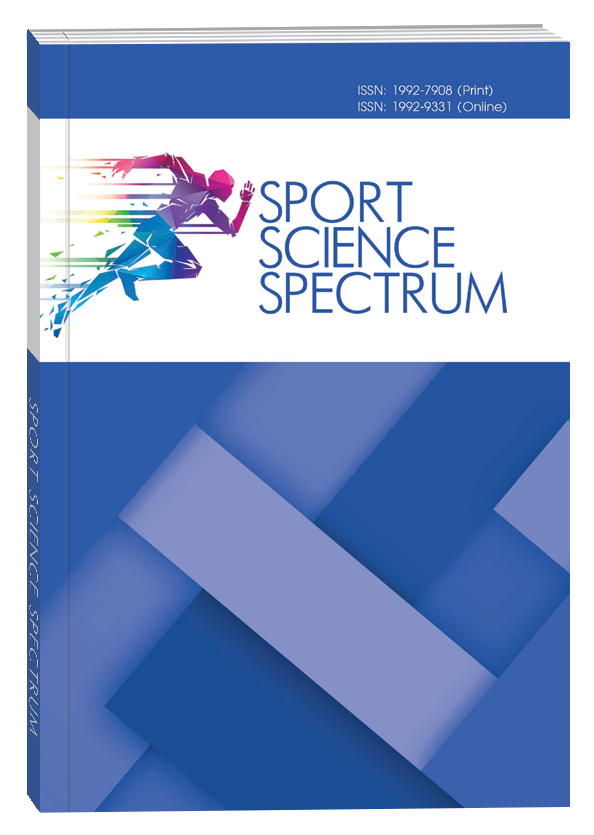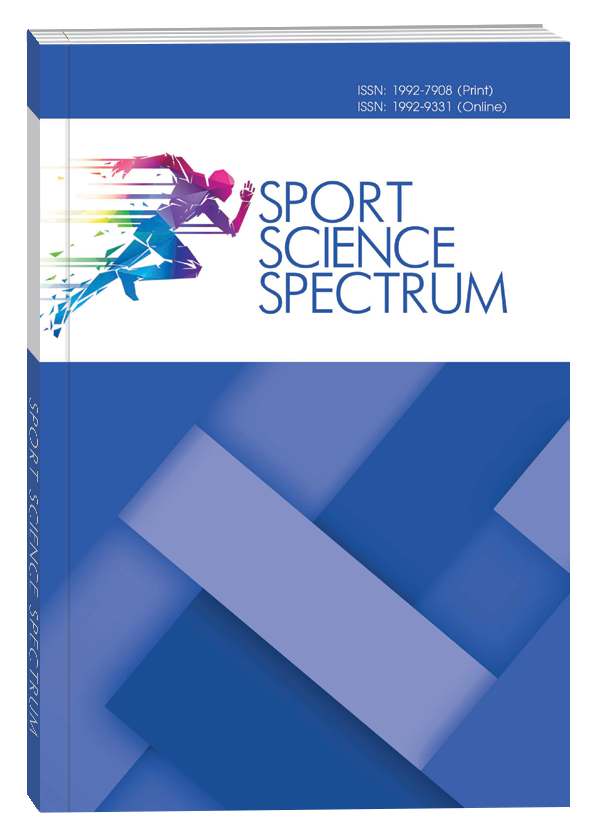FEATURES OF USING INNOVATIVE DIGITAL TECHNOLOGIES TO IMPROVE THE PERFORMANCE OF PLAYERS IN ESPORTS
DOI:
https://doi.org/10.32782/spectrum/2024-4-1Keywords:
esports, digital technologies, big data analytics, artificial intelligence, virtual reality, augmented reality, biometric tracking, voice analysis systems, cloud platforms, team interaction, individual preparationAbstract
Introduction. Esports are rapidly evolving, transitioning from a popular hobby to a professional sporting activity with significant financial and social stakes. Success in esports depends not only on players’ talent and skills but also on the effective use of modern digital technologies. The growth of professional tournaments, increased prize pools, and sponsorship engagement highlight the importance of optimizing training processes and improving team dynamics.Research objective. The study aims to analyze and determine the features of using innovative digital technologies in esports to enhance the performance of players and teams.Research methods. The study utilized the analysis of specialized scientific literature and internet data, comparative analysis, systematization, and generalization.Results. The study focuses on identifying the specifics of using technologies such as artificial intelligence (AI), big data analytics, virtual reality (VR), augmented reality (AR), biometric tracking, voice analysis systems, and cloud platforms. It reveals their adaptation to different esports disciplines, player preparation levels, and types of activities. The research demonstrated that innovative digital technologies have a wide range of applications in esports. Big data analytics is used to analyze gameplay statistics, evaluate player performance, develop strategies, and predict match scenarios, making it particularly relevant in MOBA (Dota 2, LoL) and FPS (CS:GO) disciplines. Artificial intelligence (AI) is applied to model opponents’ behavior, automate strategies, and create personalized training programs, showing the greatest efficiency in MOBA, FPS, and RTS genres. Virtual reality (VR) provides realistic simulations of gaming situations, enhancing players’ cognitive and technical skills, while augmented reality (AR) enables the visualization of strategies and analysis of the game field. Biometric tracking monitors the physiological and emotional state of athletes, including stress levels, cognitive functions, and reactions, which is especially significant in FPS and MOBA disciplines. Voice analysis systems evaluate team interactions and communication, helping to identify weak points in player collaboration, which is crucial for team-based genres like MOBA and RTS. Cloud platforms ensure accessibility to training resources, data storage, and integration with other technologies and are used across all esports disciplines.Conclusions. Innovative digital technologies open up new opportunities to improve player performance in esports, providing a comprehensive approach to training processes, strategic planning, and athlete monitoring. They contribute to optimizing both individual and team preparation, allowing training methods to be tailored to the capabilities of players at all levels.
References
1. Анохін Е. Чинники, що впливають на успішність та результативність гравців у кіберспорті. Теорія і методика фізичного виховання і спорту. 2023. № 3. С. 3–10. DOI: 10.32652/tmfvs.2023.3.3-10.
2. Пятисоцька С., Єфременко А., Подрігало Л., Петренко Ю. Обґрунтування моніторингу у кіберспорті. Освіта. Інноватика. Практика. 2024. Т. 12. № 5. С. 65–72. DOI: 10.31110/2616-650X-vol12i5-010.
3. Шинкарук О. Модель ігрової підготовленості гравців в кіберспорті. Спортивний вісник Придніпров’я. 2022. № 2. С. 158–168. DOI: 10.32540/2071-1476-2022-2-158.
4. Шинкарук О. Сучасні проблеми розвитку кіберспорту. Спортивний вісник Придніпров’я. 2024. № 1. С. 239–250. DOI: 10.32540/2071-1476-2024-1-239.
5. Шинкарук О. Формування екосистеми кіберспорту (esports) як сучасного явища спорту, культури та освіти. Спортивний вісник Придніпров’я. 2023. № 1. С. 251–260. DOI: 10.32540/2071-1476-2023-1-251.
6. Шинкарук О., Лут І., Пінчук В., Васильєв М. Вплив об’єктивних та суб’єктивних чинників на результативність команд у кіберспорті. Спортивна наука та здоров’я людини. 2024. Т. 2. № 12. С. 186–200. DOI: 10.28925/2664-2069.2024.214.
7. Шинкарук О. Розвиток екосистеми кіберспорту на сучасному етапі. Спортивна наука та здоров’я людини. 2024. Т. 1. № 11. С. 233–245. DOI: 10.28925/2664-2069.2024.115.
8. Ярмоленко М., Шинкарук О., Ординський В. Чинники, що впливають на ефективну діяльність тренера в кіберспорті. Спортивна наука та здоров’я людини. 2024. Т. 1. № 11. С. 246–259. DOI: 10.28925/2664-2069.2024.116.
9. Białecki A., Xenopoulos P., Dobrowolski P., Białecki R., Gajewski J. ESPORT: Electronic sports professionals observations and reflections on training arXiv preprint. 2023. arXiv: 2311.05424. URL: https://arxiv.org/abs/2311.05424.
10. Campbell A.J. Editorial: Progress in computer gaming and esports: Neurocognitive and motor perspectives. Frontiers in Psychology. 2021. Vol. 12. Article 686152. DOI: 10.3389/fpsyg.2021.686152.
11. Dovgan N. The pivotal role of technology in enhancing athletic performance: Insights and future directions. SSRN Electronic Journal. 2023. DOI: 10.2139/ssrn.4602857.
12. Garcia M. Neurocognitive factors in esports. Cognitive Research and Gaming Science. 2020. Vol. 8. № 3. P. 45–56. DOI: 10.1016/j.cogres.2020.04.002.
13. Haley R. Utilizing biometric data for tailoring training processes in esports. Journal of Biometric Applications in Sports. 2020. Vol. 9. №. 3. P. 67–78. DOI: 10.3389/BioApp.2020.00967.
14. Hassan A.T., Yuen K., Douris P., Zwibel H., DiFrancisco-Donoghue J. Physiological and cognitive functions following a discrete session of esports gameplay. Frontiers in Psychology. 2020. Vol. 11. Article 1030. DOI: 10.3389/fpsyg.2020.01030.
15. Jung H. Big data analysis methods in esports. Computational Gaming Analytics. 2019. Vol. 12. № 1. P. 89–102. DOI: 10.1109/CGAN.2019.01234.
16. Karelia D., Mehta D. The role of data science in esports analytics and performance evaluation. Research Gate. 2023. URL: https://www.researchgate.net/publication/369912153_The_Role_of_Data_Science_in_Esports_Analytics_And_Performance_Evaluation.
17. Martin-Niedecken A.L., Schättin A. Let the body’n’brain games begin: Toward innovative training approaches in esports athletes. Frontiers in Psychol- ogy. 2020. Vol. 11. Article 138. DOI: 10.3389/fpsyg.2020.00138.
18. Müller L. Implementation of VR/AR for simulating gaming situations in esports. Virtual Reality in Competitive Gaming. 2021. Vol. 7. №. 2. P. 205–219. DOI: 10.1177/VRCompGaming.2021.07205.
19. Munoz-Macho, A.A., Domínguez-Morales, M.J., & Sevillano-Ramos, J.L. Performance and healthcare analysis in elite sports teams using artificial intelligence: a scoping review. Frontiers in Sports and Active Living, 6. 2024, Retrieved from https://doi.org/10.3389/fspor.2024.1383723.
20. Novak A.R., Bennett K.J.M., Pluss M.A., Fransen J. Performance analysis in esports: Modelling performance at the 2018 League of Legends World Championship. International Journal of Sports Science & Coaching. 2020. Vol. 15. № № 5–6. P. 809–817. DOI: 10.1177/1747954120932853.
21. Novak A.R., Bennett K.J., Pluss M.A., Fransen J. Performance analysis in esports: modelling performance at the 2018 League of Legends World Cham- pionship. International Journal of Sports Science & Coaching, 15 (5–6), 809–817. 2020, Retrieved from https://doi.org/10.1177/1747954120932853.
22. Pharr J.L. Hacker Combat: A Competitive Sport from Programmatic Dueling & Cyberwarfare. arXiv preprint, arXiv: 1703.04874. 2017, Retrieved from https://arxiv.org/abs/1703.04874.
23. Smerdov A., Kiskun A., Shaniiazov R., Somov A., Burnaev E. Understanding Cyber Athletes Behaviour Through a Smart Chair: CS:GO and Monolith Team Scenario. arXiv preprint, arXiv: 1908.06407. 2019. Retrieved from https://arxiv.org/abs/1908.06407.
24. Smith J. The Role of Analytics in Esports Performance. Journal of Esports Studies, 2021, Vol. 10, № 2, pp. 123–134. Retrieved from https://doi.org/ 10.1007/s00146-021-01123-5 .
25. Tanaka K. Artificial Intelligence for Predicting Opponent Behavior in Esports. AI and Interactive Gaming, 2022, Vol. 15, № 4, pp. 345–360. Retrieved from https://doi.org/10.1080/AIIG.2022.0354.
26. Varga P., Scholz T.M., Tan E.T.S. Esports Player Analytics. Routledge Handbook of Esports. 2024. Retrieved from https://doi.org/ 10.4324/9781003410591-21.
27. Xiao L., Cao Y., Gai Y., Liu J., Zhong P. Review on the application of cloud computing in the sports industry. Journal of Cloud Computing, 12, Article 152. 2023. Retrieved from https://doi.org/10.1186/s13677-023-00531-6





